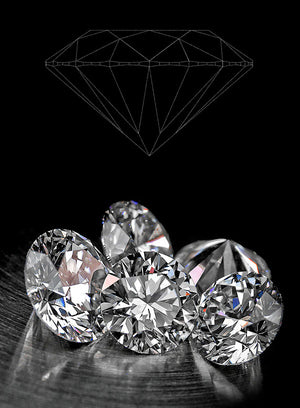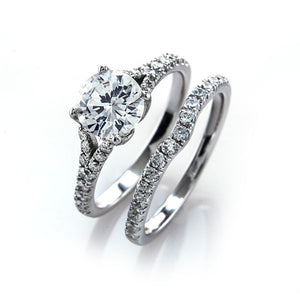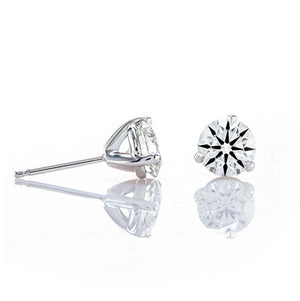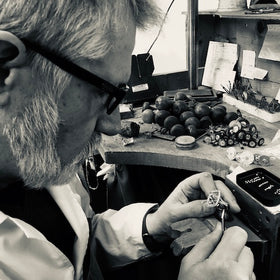
What Is the Difference Between a 14k and an 18k White Gold Engagement Ring?
Among the many decisions you’ll make when you buy a diamond engagement ring is choosing the right type of metal for your band. Two of the most popular options are 14k and 18k white gold. But what is the difference between these types of white gold?
While the price difference between the two usually isn’t enough to make or break your decision, we certainly think the investment in 18k white gold pays off because it looks brighter and whiter.
Keep reading for a breakdown of 14k white gold versus 18k white gold to explain our stance on these engagement ring metals.
The Differences Between 14k and 18k White Gold

There are differences, some of which are available to the naked eye, between 14k and 18k white gold. Understanding these differences will help you make the right choice for your ring.
Appearance, Color, and Shine
A reason why 18k white gold has a more desirable appearance than 14k gold is because of its higher gold content.
With a higher gold content, the metal is purer and less prone to oxidation, keeping it whiter and brighter than 14k white gold rings, which oxidize over time when their rhodium plating wears off.
Metal Allergies
This additional purity benefits the appearance of 18k white gold and the person wearing it: 18k white gold is a better choice for people with metal allergies.
Keep in mind that there is still the possibility that somebody might experience sensitivities to the other alloys mixed with white gold, even if they exist to a lesser degree.
Going platinum is likely the best option if you suffer from metal allergies since it is hypoallergenic.
Purity and the Karat System
Using the karat system, a 14k white gold ring contains 58.3% gold and 41.7% other metals used to change the color of the gold from yellow to white.
The gold content of 18k white gold is 75%, which is why it costs more than 14k white gold – it is more pure.
Purity has advantages in terms of appearance and the ability of your ring to stay brighter over time. However, the purer the gold, the softer it becomes, which we’ll address in a moment.
Durability and Hardness
One argument we’ve heard retail jewelers use to explain why they inventory 14k white gold engagement rings instead of 18k white gold engagement rings is this:
“14k white gold is more durable than 18k white gold.”
From a technical standpoint, 14k white gold is harder and, in turn, more durable than 18k white gold. If you ask us, this isn’t a strong argument as the difference is not substantial.
Thus, durability should not be a critical factor in choosing an engagement ring of 14k or 18k white gold.
If you do something severe enough to damage an 18k white gold ring, the reality is that it’s probably something substantial enough to damage a 14k white gold ring, too.
Price and Value
Although the initial investment in an 18k white gold engagement ring might be higher than 14k white gold, this investment pays off in the long run.
The alloys in 18k white gold do not need to be rhodium-plated or electroplated white because they aren’t prone to oxidation like most alloys in 14k white gold engagement rings.
So, over time, 18k white gold jewelry is more cost-effective because it requires less maintenance.
What is the Most Popular 14k White Gold Engagement Ring?

Our standard four prong solitaire and six prong solitaire settings are the most popular 14k white gold engagement ring styles.
However, it is unclear if they are so popular because people simply prefer them or if they are popular because this style is widely recognized as the traditional engagement ring.
If you are a fan of the simpler, more traditional style, this Petite Hidden Halo Solitaire in 14k white gold might be exactly what you’re looking for.
These settings feature a four or six-prong head with straight die-struck prongs. They are mass-produced to accommodate a wide range of sizes.
What is the Most Popular 18k White Gold Engagement Ring?

Beyond a shadow of a doubt, the most popular 18k white gold engagement ring is the classic six prong half-round solitaire. The first thing you’ll notice about this setting is that the head configuration features a bit of extra flair. It creates the illusion that the head is a six prong crown.
Another great choice is the classic knife-edge style solitaire. It features the same head configuration set atop a knife-edge ring shank, which is not actually sharp like a knife. Rather, the outer edge of the ring shank comes to a slight point in a kind of > shape, hence the name.
While 14k white gold solitaire engagement rings are die-struck and mass-produced to accommodate a broad spectrum of carat weight (e.g., 1.00 to 1.25 carats), these 18k gold settings are custom and made-to-order. The prong configuration is specifically designed to accommodate the dimensions of the diamond you order.
What is the Most Popular 18k White Gold Halo Setting?
The Anita Halo has quickly become Brian Gavin Diamonds’ top-selling, most popular 18k white gold halo setting. This setting is named after a client Anita, who dreamed of an affordable halo setting that fully encompassed her diamond in a field of floating diamonds.
Along with all of Brian Gavin Diamonds’ custom-designed engagement rings, it is the client’s honor to decide upon the name used to feature them in our catalog. All Brian Gavin Signature engagement ring settings are also custom and made-to-order.
The Milgrain Halo Engagement Ring is also worth considering. Its signature hearts and arrows diamond melee perfectly suits round, princess cut, cushion, oval, emerald, and asscher-cut center stones.
This means the halo setting accommodates the dimensions of the specific diamond ordered. While 14k white gold remains popular, we believe 18k is the best option.
How to Choose the Right Diamond for Your 14/18k White Gold Engagement Ring
Choosing the right diamond is important regardless of the metal. When making your decision, consider a diamond’s 4Cs (cut, clarity, color, and carat weight), but don’t forget about its cut/performance in addition to its cut/quality.
This is what we call the fifth C, and grading a diamond with this additional step helps achieve visible perfection. It accounts for a diamond’s light performance, which is dictated by how it’s cut.
Shop for Sparkling White Gold Engagement Rings
At the end of the day, the jewelry design staff of Brian Gavin Diamonds prefers 18k white gold to 14k white gold.
That’s because 18k white gold appears to be brighter and whiter than 14k white gold while it also maintains its luxurious appearance without the necessity of being rhodium-plated.
Engagement rings with 18k white gold also require less maintenance to look their best, so you will get more enjoyment out of your ring and spend less time cleaning and polishing it.
Whether you prefer 14k white gold, 18k white gold, yellow gold, 14k rose gold or platinum, Brian Gavin Diamonds has the engagement ring of your dreams.
We also offer virtually any diamond you could dream up, including lab-grown diamonds. In response to a growing demand for lab diamonds, Brian Gavin Diamonds Lab uses a patented diamond growth process that delivers superior performance.
Whether you choose a lab-grown diamond or a natural diamond, you can be sure you are getting the best sparkle either way.
Begin your search for beautiful engagement rings with lab diamonds and natural diamonds today or get started with a custom ring of your choice.
















